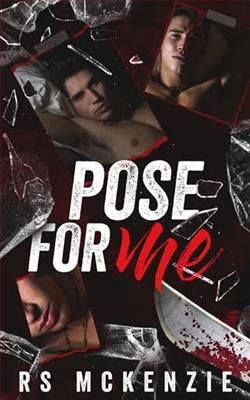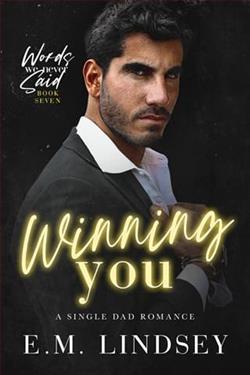Page 1 of Tempted to Rebel
Chapter 1
Celia
Muffledwhispers swirl in the air as wedding guests grow anxious, tired of waiting for the ceremony to begin. I keep my hands folded in my lap and my ankles crossed beneath the pew. Silent. Watching. A shiver rolls down my spine as guards shift before my eyes, transforming from well-dressed men into thugs and brawlers in padded armor and black, faceless masks. A new security detail has taken over the room, and no one seems happy about it. There’s an energy swirling around them—a crackle in the air that snaps and pops every time one of their fingers twitch on their guns or they scuff their boots on the marble.
They’re waiting for something, just like the rest of us.
Once the few attentive guests catch on to the shift in guard detail, whispers flow more freely, spilling like water through the aisles. One ripple of fear turns into a wave, engulfing the room in panic, and suddenly, people are shouting. Guests reach for their weapons, forgetting that all firearms, knives, and blunt objects were checked at the entrance to the church.
The panic swells in a crescendo that echoes in the rafters.
No one is safe. Old, wooden pews act as barriers, trapping the crowd in neat, little rows waiting to be gunned down. The more agile guests leap from their seats, some seeking answers fromknown bratva personnel—perhaps a cousin or an uncle—while others rush the closed outer doors.
None of the guards move to stop them.
The heavy wood rattles against chains hidden on the other side, barring them shut from the outside. The sound echoes louder than the voices, and I watch as people shrink into themselves, avoiding the memory of cold iron kissing their wrists and keeping them prisoner. Others, invigorated by the possibility of violence, crack their knuckles and approach the guards with cocksure smiles.
The screaming begins. It echoes through the rafters and pings off of every piece of stained glass lining the Sanctuary walls, ricocheting louder than any bullet. The force of it rings in my ears, making me flinch.
I should have never agreed to accompanying my mother to a bratva event, let alone a wedding for itspakhan.
“Celia.” My mother clicks her tongue in disapproval. “Compose yourself.” Unlike most of the people surrounding us, she’s unaffected by the chaos erupting around us, maintaining an icy distance from her emotions.
She has one thing I lack within the bratva:experience.
“What’s going on?” I crane my neck to get a better look, but in my heart, I already know that something has gone wrong. The wedding is over before it ever began.
Two masked men drag someone out of the room, smearing blood across the polished marble. I stare at the crimson streak as my body turns ice cold, unable to believe what I’m seeing.
A wedding should be sacred. It should be full of love and light—not this.Anything butthis.
I fight a rush of tears, knowing that they’ll only stoke my mother’s ire. Why is nothing sacred in this godforsaken city? Why must everything involving my family turn to violenceand chaos? Can’t there be a single day of happiness, justoneinnocent moment of peace?
A pair of young children, a little boy and a littler girl, hold each other in the row in front of us. The girl whimpers softly while the boy tries to be brave, emulating the stony expressions he sees on all of the adults around him, including my mother.
Forced to be brave when he’s still only a child. My heart cracks, and a wave of grief for every child forced to witness these events flows freely through my veins.
“Hey,” I murmur, keeping my tone gentle and soft. “Everything is going to be okay.”
Their father turns to glare at me, his jaw clenching as he chews on his thoughts before they turn into words. “Adella,” he says finally, addressing my mother, “what a shame it would be for your son’s marriage to fall apart before it’s even begun.” His glare pings between the two of us. “Then again, the Monrovias have a poor track record when it comes to their spouses. Perhaps Mikhail should give up before he’s either dead or divorced by Christmas.”
My mother presses her lips into a fine line. “Watch your tongue, Fiero, before someone’s hand simply—” she flashes a three-inch knife concealed within a silver tube of lipstick—“slips.”
A vein in Fiero’s neck pulses as he swallows and chooses to remain silent. He turns to his children and ushers them to the other side of the pew away from us. When he tries to exit into the aisle, a masked man shoves to his chest, stopping Fiero in his tracks. He argues with the guard until a rifle smashes into his face with a sickeningcrack,a second masked man hauling Fiero away without further warning. Fiero shouts Russian curses even after the doors to the hallway close behind him.
He left his children behind.
The little girl starts to cry in earnest, and I gather my skirts and leap over the back of the pew to reach her. “Hush, now,” I soothe, petting both the children’s heads. “Everything will be okay.Shhh.”
My heart breaks for the children—less so for their father. No one else steps up to claim his kids as theirs, despite my silent searching for a second parent. Everyone avoids meeting my eye. My mother is the exception; her disdain unmistakable. Before we ever arrived, she warned me to keep a low profile. Pretending that everything is fine is her specialty, and after navigating the social ruin that my divorce brought our family name, she’s become an expert.
Normally, I would do as I’m told and keep my head down, but today is anything but a normal day, and these children deserve better memories than this.
One of the guards aims his rifle toward the crowd. “Everyonemove!” He repeats the order in Russian while a half dozen other guards follow his lead and corral us into the four corners of the room, separating us by age and ability. I’m placed with the younger group of women and children, while my mother is split into another group with women closer to her age. A few people argue, but anyone who raises true hell gets pistol-whipped or punched in the gut and removed from the room entirely, following the path of blood. Every time someone opens the doors that lead outside the Sanctuary, we hear the rapid-firetat-tatof a gun or the agonized scream that comes after. I remove my shawl and wrap it around Fiero’s little girl’s neck, careful to cover her ears. “Keep this on,” I instruct, tying a loose knot at the base of her neck, “it’ll help with the noise.” She looks up at me with wide eyes, and I enlist her brother’s help to keep the shawl in place.
Too soon, a guard approaches my corner of the cathedral and sizes up our group like livestock. Fire stirs in my chest with eachkick of my heartbeat, and I quickly move to the front of the group and stand in his way before he can grab anyone and haul them off. “Back thefuckup,” I hiss, bracing myself as best as I can for whatever violence comes next. My entire body shakes from adrenaline and frayed nerves, the careful control I keep over my fear having snapped the moment Fiero’s daughter first started trembling.
I might be afraid, but I willnotlet them touch the children.















